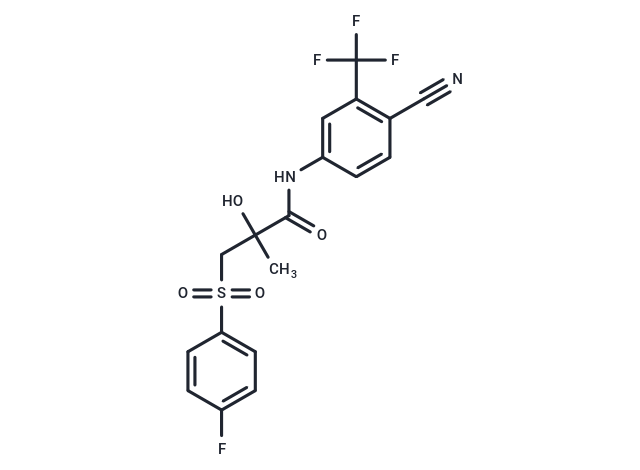Shopping Cart
- Remove All
 Your shopping cart is currently empty
Your shopping cart is currently empty


| Pack Size | Price | Availability | Quantity |
|---|---|---|---|
| 50 mg | $32 | In Stock | |
| 100 mg | $45 | In Stock | |
| 200 mg | $53 | In Stock | |
| 500 mg | $68 | In Stock | |
| 1 g | $85 | In Stock | |
| 1 mL x 10 mM (in DMSO) | $48 | In Stock |
| Description | Bicalutamide (ICI-176334), a synthetic, nonsteroidal antiandrogen, competitively binds to cytosolic androgen receptors in target tissues, thereby inhibiting the receptor binding of androgens. |
| Targets&IC50 | Androgen receptor:0.16 μM |
| In vivo | Single bicalutamide reduces tumor growth by 79%, at defined submaximal doses. The ridaforolimus-bicalutamide combination exhibits improved and potent antitumor activity, almost completely abrogating tumor growth. The combination is also well tolerated, as evidenced by no significant changes in body weight over the course of treatment. Plasma PSA levels are again tightly linked to tumor growth in the combination-treated mice. [3] |
| Kinase Assay | Whole-cell competitive binding assays: Whole-cell competitive binding assays are performed in LNCaP/AR(codon-switch) (LNCaP/AR(cs)) (harbors a mixture of exogenous wild-type AR and endogenous mutant AR (T877A)) and cells propagated in Iscove's or RPMI media supplemented with 10% fetal bovine serum, or during the assay with 10% charcoal-stripped, dextran-treated fetal bovine serum (CSS). Cells are pre-incubated with 18F-FDHT, increasing concentrations (1pM to 1 μM) of cold Bicalutamide are added, and the assay is performed to measure specific uptake of 18F-FDHT (4). IC50 values are determined using a one site binding model with least squares curve fitting and R2 > 0.99. |
| Cell Research | Exponentially growing C4-2 cells are plated into two 96-well plates and incubated overnight at 37 ?C. Twenty-four hours later one plate is aspirated and stored at -80 ?C and the other treated with 10-fold serial concentrations of ridaforolimus (1000 nM to 0.0001 nM) or vehicle (ethanol). Following 72 hours culture at 37 ?C, the plates are assessed simultaneously for cell growth using the Cy qUANT Cell Proliferation Assay kit. Bicalutamide and Ridaforolimus combination proliferation assays are performed similarly except cell growth is determined as the change in cell number between vehicle control and compound treated cells after 72 hours in culture.(Only for Reference) |
| Alias | ICI-176334 |
| Molecular Weight | 430.37 |
| Formula | C18H14F4N2O4S |
| Cas No. | 90357-06-5 |
| Storage | Powder: -20°C for 3 years | In solvent: -80°C for 1 year | Shipping with blue ice. | ||||||||||||||||||||||||||||||||||||||||
| Solubility Information | DMSO: 60 mg/mL (139.41 mM) Ethanol: 4.3 mg/mL (10 mM) | ||||||||||||||||||||||||||||||||||||||||
Solution Preparation Table | |||||||||||||||||||||||||||||||||||||||||
Ethanol/DMSO
DMSO
| |||||||||||||||||||||||||||||||||||||||||

Copyright © 2015-2024 TargetMol Chemicals Inc. All Rights Reserved.